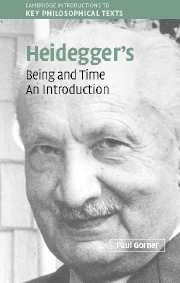6 - Truth
Published online by Cambridge University Press: 05 June 2012
Summary
In its various modes of comportment to beings or entities – what is – Dasein uncovers (dis-covers, entdeckt) beings or entities. It lets them show themselves. Correlative to the uncovering of entities is the uncoveredness (Entdecktheit) of entities. But such uncoveredness of entities is only possible on the basis of disclosedness (Erschlossenheit) – the disclosedness of world. The disclosedness of world – which is not itself an entity – makes possible both the uncovering and the uncoveredness of entities. Heidegger will argue that these notions are the key to a proper understanding of the nature or essence of truth. This is the topic of § 44 (‘Dasein, Disclosedness and Truth’).
But first we need to say something about what lies behind Heidegger's treatment of this topic and the centrality he gives to it. Why does the topic of truth have such a prominent place in Being and Time? It is a topic which figures in logic but also in epistemology. But fundamental ontology is neither of these things. What does the question of the nature of truth have to do with the question of being? Heidegger begins by pointing out how historically there has been a connection between truth and being. The first discovery of the being of beings by Parmenides ‘identifies’ being with the perceptive understanding (vernehmendes Verstehen) of being. Aristotle defines philosophy as the science of truth but also as the science that considers beings as beings, that is, with regard to their being.
- Type
- Chapter
- Information
- Heidegger's Being and TimeAn Introduction, pp. 94 - 104Publisher: Cambridge University PressPrint publication year: 2007



